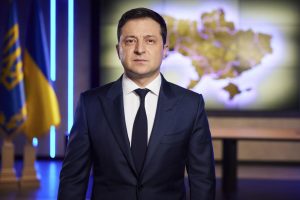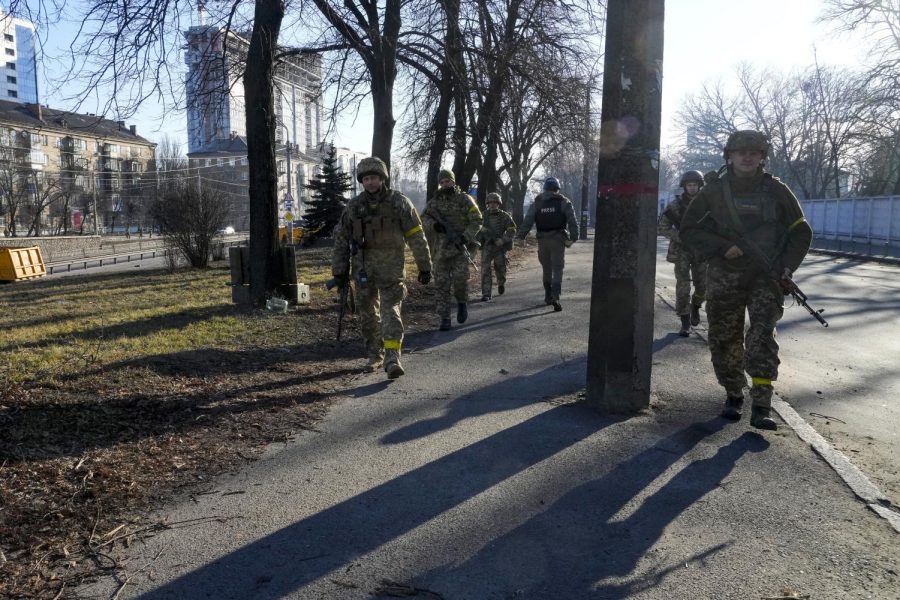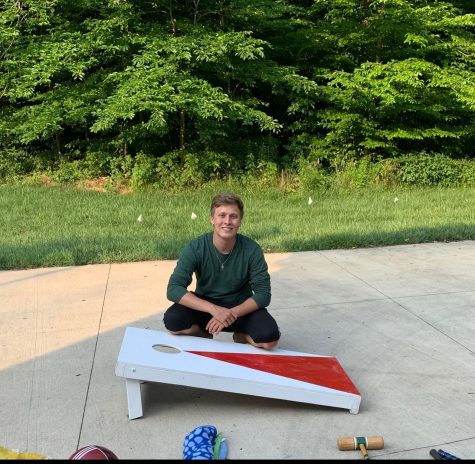Russia invades Ukraine
Ukrainian soldiers patrol an area not far from burning military trucks in a street in Kyiv, Ukraine, Saturday, Feb. 26, 2022. Russian troops stormed toward Ukraine’s capital Saturday, and street fighting broke out as city officials urged residents to take shelter.
Feb 26, 2022
Early Thursday morning, Ukrainians awoke to Russian forces officially invading the nation. These Russian forces came in “…through northern forests, eastern plains and along the southern coast, igniting battles around the country that left dozens dead.” This has been an accumulation of threats made in the previous weeks. In an address, Vladimir Putin claims, “he had ordered “a special military operation” to protect people, including Russian citizens, subjected to ‘genocide’ in Ukraine.” This is a baseless claim, according to several NATO countries. Dozens of individuals were reported dead in the early hours of Thursday, with the rest of the day marked by Russian aggression in various parts of the country. According to the UN refugee agency, more than 100,000 Ukrainians have attempted to flee the area.
Russian forces, according to a senior U.S. defense official, are working towards the Ukrainian capital of Kyiv. Putin furthered his invasion on Friday, with multiple airstrikes on different cities and military bases. Kyiv is the capital city of Ukraine where different airstrikes killed more than 100 civilians. With Russian advancements, Ukrainian officials urge residents to stay inside and to “prepare Molotov cocktails” in preparation for conflict in the city. The weight of the situation was clear in remarks from Ukrainian President Volodymyr Zelenskyy, “the fate of the country depends fully on our army, security forces, all of our defenders.” Millions within Kyiv and other cities in Ukraine are facing serious threats from the quickly advancing Russian army.

The Biden administration has decided to respond with economic sanctions and condemnations of Russia. According to the White House, several sanctions have been implemented, such as “sweeping financial sanctions and stringent export controls that will have a profound impact on Russia’s economy, financial system, and access to cutting-edge technology.” These sanctions are believed to cut off more than half of Russia’s high-tech imports, restricting Russia’s access to vital technological inputs, [and] atrophying its industrial base.” However, many feel that the Biden administration has not done enough and should get involved militarily or toughen sanctions. Former Vice President Mike Pence supports increased sanctions because “Putin only understands strength.” Many other critics of the President call for him to send troops into Ukraine.
Anastasia Zhydan ‘23, Biology major at JCU, is a Ukrainian-American who is watching in horror as her friends and family face grave danger. Zhydan said, “I currently have family members that are living in Ukraine such as my grandparents from my father’s side, aunts, uncles [and] cousins…most are living in the capital of Ukraine, Kyiv.” The recent attacks on the capital have left her family in close proximity to deadly attacks. She also feels, “as though the American government is not doing enough to respond to this crisis that is happening.” Although the U.S. has placed some sanctions on Russia, she feels it “is still not enough.” Zhydan argues that “doing nothing or little at all is risky too.” she continued, “It shows that Russia can do what it wants to Ukraine. That is the unfortunate message I am interpreting.”
Daniel Kilbride, professor of History and director of the JCU Honors Program, claims that the sanctions on Russia impact the long term and “they won’t induce Russia to respond in the short term.” Putin’s claim to protect “ethnic Russians in Donetsk and Luhansk is nonsense, just a pretext for a wider invasion.” This is the same view that many Western leaders share, which is demonstrated with the invasion continuing into Ukraine, which means it was never just about the certain areas of ethnic Russians. Kilbride stated, “a new world war seems very unlikely, but there are a lot of unanticipated events and accidents in wars, and the possibility of unintentional escalation cannot be ruled out.”













